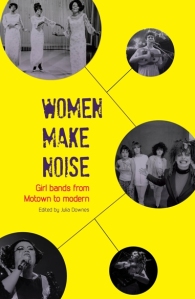Tagged: the raincoats
From Olympia to the Valleys: What Riot Grrrl Did and Didn’t Do for Me
[This essay first published in the Wales Arts Review, with artwork by the tremendous Dean Lewis.]
With riot grrrl now approaching the status of a heritage industry, not to mention Courtney Love’s current incarnation as the post-grunge Norma Desmond, it can be hard to recall that both of them helped me find my feminist footing on the slippery rocks of a ’90s girlhood. This is a roundabout remembrance of how it happened.
I.
The arts have long been a space for radical expression by women, even if the extent of that radicalism has often gone under-acknowledged. In 1915, the author and journalist Dorothy Richardson produced Pointed Roofs, credited as the first English stream of consciousness novel, using an innovative prose style which she saw as necessary for the expression of female experience. Virginia Woolf observed that Richardson ‘has invented, or, if she has not invented, developed and applied to her own uses, a sentence which we might call the psychological sentence of the feminine gender’. If Richardson’s challenge to linguistic convention in her writing has musical counterparts, one of them is the ‘new, raw and female’ sound made possible by post-punk. Punk removed barriers of precedent and technical expertise to engagement in music, enabling trips into less-charted musical and lyrical territory. But it was in the subsequent voyage of discovery that was post-punk that punk’s revolutionary potential really bore fruit, and the untried, experimental nature of post-punk music was particularly suited to women.
Post-punk: a plug and a playlist.
I am in print this month, having written a chapter on women in post-punk for Julia Downes’ new history of the girl band, Women Make Noise. A surprisingly difficult part of this was establishing what we talk about when we talk about post-punk. Post-punk’s disorderly, subversive and category-resistant nature has seen it marginalised in accounts of its era, although the past few years have produced a handful of useful retrospectives, as well as the early-2000s revival of post-punk musical techniques which, if you still can’t explain what it is, at least make it easier to explain what it sounds like.
For me, a large part of post-punk’s significance was that it seemed to involve an unprecedented amount of women as artists, fans, critics and ideologues. Extending the gains of punk’s emphasis on DIY culture, accessibility and amateurism, post-punk women were able to take their bands in experimental and innovative directions. Post-punk’s ideological concern with the politicisation of the personal, and with identifying and promoting authenticity in the face of popular cultural stereotypes, lent itself to exploration from a feminine and feminist angle, resulting in lyrics which demystified and deconstructed conventional femininity, love, sex and romance, and which analysed social and cultural pressures on women or the tensions of personal relationships in implicitly political ways. Continue reading
Patti Smith, Outside Society
Written for Wears the Trousers 09.09.11
*
The past few years have consolidated Patti Smith’s position as godmother and high priestess among women musicians. Following her induction into the Rock N Roll Hall Of Fame in 2007, last year saw Just Kids, her memoir of life in ’70s New York, receive a National Book Award and a future stage adaptation, and just last week she was awarded the coveted Polar Music Prize by the King of Sweden. Where this leaves her as an artist who once proudly and profanely proclaimed her position “outside of society” is anyone’s guess, but the establishment’s recent embrace of Smith appears to have been the spur for the release of this collection, a primer or sampler of her work aimed, presumably, at those discovering it for the first time. Continue reading
The Raincoats, Odyshape
Written for Wears the Trousers 26.08.11
*
The wave of musical experimentation which took place in the wake of punk generated many new and startling sounds, some of which endured and grew in influence while others became lost to musical history. The Raincoats, a London-spawned, ever-shifting collective based around the partnership of Gina Birch and Ana Da Silva, are now firmly in the former category. Their self-titled debut was described by Vivien Goldman as “the first woman’s rock album” to emerge, its lack of musical or vocal hierarchies or focus-pulling solo virtuosity pioneering an arresting and persuasive kind of rock without the cock. In 1981, Odyshape continued to shift the rules of the game. Continue reading
